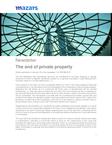
The end of private property
The bill establishes that "abandoned accounts are considered to be those checking or savings accounts on which no deposit, withdrawal, transfer or, in general, any debit or credit affecting them has been made for 3 uninterrupted years (...)".
Once enacted, it will suffer from two irremediable defects for which it will most probably be declared unconstitutional: (i) its retroactivity and (ii) the disregard of the constitutional right to private property. Regarding the first defect, as it is conceived, the three years of abandonment will be counted retroactively, i.e., they will not be counted into the future (from the moment the law is enacted) but the accounts that at the time the law enters into force, have not been used for more than three years, will be confiscated. This retroactivity is at odds with the constitutional principles of good faith and certainty that irrigate the regulatory system of private property and which require that, in light of the provisions of Article 58 of the Constitution, when this is to be limited for reasons of public utility or social interest, there must be a "prior law" that clearly defines such reasons.
Regarding the second defect, our constitutional system establishes that private property is a social function and, as such, it generates obligations. By virtue of such obligations, the legislator may impose restrictions to its right of ownership, always respecting the core of the right itself, understood as the minimum level of enjoyment and disposition of an asset that justifies the presence of a private interest in the property.
This right has three limitations; expropriation (which is given for reasons of public interest and entails a compensation), extinction of ownership (which is given for the unlawfulness of the cause that precedes the obtaining of ownership) and confiscation (which is a penalty that affects the patrimony of the person who has been convicted of a crime and implies the loss of his property in favor of the State. Confiscation is a penalty that is prohibited in Colombia by express provision of Article 34 of the Constitution).
In judgment C-133 of 2009, the Corporation studied a lawsuit against article 70 of Law 510 of 1999, which established that, if the exercise of the economic and/or political rights of the holders of shares registered in the Rnve was not accredited, the issuing company could, by decision of its assembly, repurchase them for their intrinsic value. At that time, the Court established -prior to decreeing the rule unconstitutional- that the property establishes a perpetual right for its holder (insofar as it lasts as long as the good over which the domain is incorporated persists) and is not extinguished by its lack of use.
The present law has a clearly confiscatory purpose, by means of which it penalizes -with the loss of the ownership of the property- whoever abandons or has abandoned its financial products for more than three years.
Given that confiscation is prohibited by article 34 of our Political Constitution, and that the abandonment of financial products can never constitute a crime in itself, the Court will have to declare its unconstitutionality when these charges are presented for its study. Otherwise, we would be beginning to live the end of private property in Colombia.


